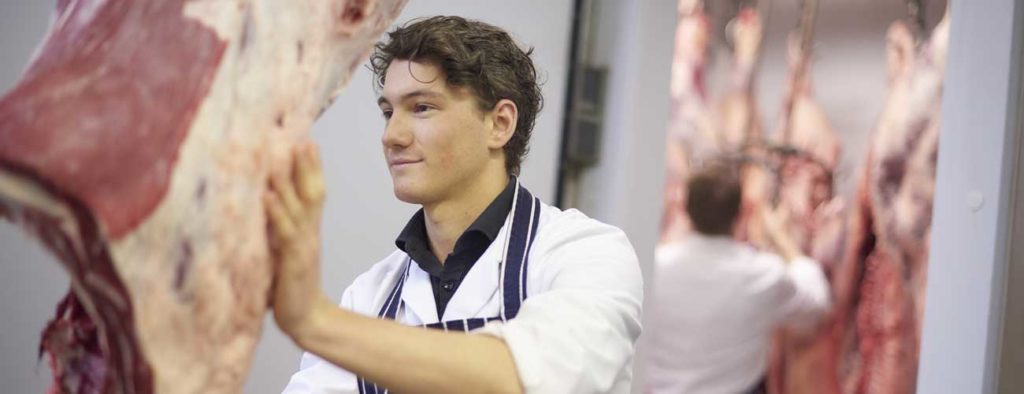Meat Industry Apprenticeships
Modern apprenticeships have transformed in recent years, with the introduction of new apprenticeships based on ‘standards’ raising the bar on training in the food industry.
The meat industry is at the forefront of this, with butchery being the first food craft apprenticeship to be granted government approval, and the abattoir industry now having its very first dedicated apprenticeship.
Why are the new apprenticeship standards better than previous apprenticeships?
Developed by employers for employers
Nobody knows the skills, knowledge and behaviours needed in a job better than the employer. Meat industry employers need apprenticeship training that delivers ‘work ready’ employees. Apprenticeship standards are designed to do just that!
Apprentices prove their skills at end-point assessment
One of the biggest changes is that apprentices don’t automatically qualify after ‘serving their time’. They need to provetheir new skills at ‘end-point assessment’, or EPA. EPA is the name given to a series of challenging tests that happen towards the end of an apprenticeship. Apprentices must succeed at end-point assessment to achieve their apprenticeship. Succeeding at EPA gives both apprentice and employer confidence in their abilities.
Government funding for apprenticeships now in the hands of employers
This means employers now have the freedom to choose their own apprenticeship training providers and end-point assessment organisations. Large employers (˃£3m pa wage bill) fund apprenticeships through the Apprentice Levy whilst smaller employers (˂£3m pa wage bill) co-invest with government at a rate of just 5%. What’s more, employers have the flexibility to negotiate apprenticeship training costs and details with a provider, or even deliver their own food training.
Level 2 Butcher Apprenticeship Standard
The Level 2 Butchery Apprenticeship is aimed at novice to intermediate level butchers and typically takes 18-24 months to complete. It develops knowledge about the range of meat species and their supply chains, and the various techniques needed to process and/or produce meat products. Apprentice butchers will learn to cut and prepare products to specification for commercial or retail customers.
In addition, mandatory qualifications in Knife Skills, Food Safety and Health and Safety are part of the apprenticeship and must be achieved prior to completion.
The apprenticeship encompasses core modules and sector-specific pathways, making it suitable for butchers working in all sectors of the meat industry:
- Process Butchery
- In-store (supermarket) Butchery
- Retail/Craft Butchery
For more information: Download the Level 2 Butcher Apprenticeship Standard
Level 3 Advanced Butcher Apprenticeship Standard
The Advanced Butcher Apprenticeship is aimed at more experienced butchers looking to develop both their butchery and their business management skills. This higher-level butchery apprenticeship enables both career progression for employees and succession planning for employers. The apprenticeship typically takes 18-24 months to complete and also contains sector specific pathways for Processing, In-store and Retail/Craft butchery.
An Advanced Butcher apprentice will develop high level knife skills as well as an all-round understanding of the craft/processing environment. Responsibility is a key word. Advanced Butcher apprentices will be capable of taking responsibility; either for a processing function, a shop or meat counter.
Management level understanding of food safety, health and hygiene systems is required of the Advanced Butcher. As such, level 3 qualifications in Food Safety Supervision, HAACP, and Health and Safety are mandatory elements of the apprenticeship.
For more information: Download the Level 3 Advanced Butcher Apprenticeship Standard
Level 2 Abattoir Worker (Red Meat) Apprenticeship Standard
The abattoir apprenticeship is the first of its kind in the red meat slaughter industry. It aims to raise the bar of training for abattoir workers, enabling them to work safely and with a high regard for animal welfare. Typically, the apprenticeship takes 16-22 months to complete.
Working in an abattoir comes with responsibility – for the animals within the apprentice’s care, for health and hygiene, and for food safety. All are taken extremely seriously in the abattoir industry and form an important part of the Abattoir Apprenticeship Standard.
Today’s slaughter industry is highly mechanised, and the abattoir apprentice will learn how to use a range of machinery in the course of their training.
Abattoir workers must hold a valid licence to operate, known as a Certificate of Competence, to comply with the Welfare of Animals at the Time of Killing (WATOK) legislation. As part of their apprenticeship the abattoir apprentice must achieve the Level 2 Award for Proficiency in Protecting the Welfare of Animals at Time of Killing (WATOK).
For more information: Download the Abattoir Worker Apprenticeship Standard
Still have a question?
Visit www.foodtraining.org.uk or contact the Food and Drink Training and Education Council at ftc@foodtraining.org.uk.






